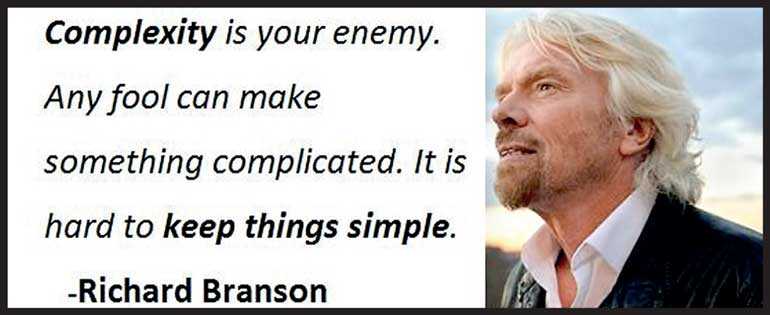Wednesday Feb 18, 2026
Wednesday Feb 18, 2026
Monday, 28 May 2018 00:00 - - {{hitsCtrl.values.hits}}

Simplicity is sometimes the most difficult thing to find in management.
It’s difficult working in an environment where complexity is the gold standard.
It can even wear out the best employees and cause them to start planning their exit strategy.
7 signs of a Manager who likes to make things complicated:
1.They waste employees’ time on multiple useless meetings.
2.They don’t delegate or empower employees. They prefer to micromanage.
3.They protect silos and uphold the organisational hierarchy. They emphasise the distinction between staff and management.
4.They are inflexible and focus on the red tape. They always go by the book.
5.They take a good functioning system and turn it into chaos for the sake of improvement.
6.They withhold information to ensure they are always the smartest person in the room.
7.They don’t train, mentor or coach employees for fear they may surpass them or they may see things are simpler than they make it to out to be.
“Management is about handling complexity. Leadership is about creating simplicity” – Peter Docker.
Keeping things simple means keeping them effective and efficient. Always complicating things can be mentally and physically draining for employees. If you ever worked for such a boss, you know how stressful it can be. They make mountains out of molehills, for simple things as, an employee needing time off or wanting to take their lunch break earlier. They make the process harder than it is. To explain a point they carry employees around in circles to end up at the same starting point. They start from the letter A to get to the letter Z to show how knowledgeable they are, instead of just starting at Z. They are poor communicators. Being able to share complex things in a simple way requires maturity, wisdom and a clear understanding of the situation.
You’ve probably heard the saying, ‘If it isn’t broken, don’t fix it!”, or some kind of variant of it. Of course in this technological age we need to be continuously embracing change but such managers may take a good functioning system and ruin it. If an employee develops a better method of doing something, they refute it. Things should only be done their way. They see less need for a two-way dialogue because they believe they have the solutions. They review things over and over again which adds a lot of unnecessary work for their employees. In the end, this only leads to confusion and reduced productivity.
In my opinion a good manager only has 2 main priorities:
1.Remove all unnecessary obstacles from your subordinates’ path so that they have a greater chance for success
2.Make available as much support (time, resources, effort) as possible to increase your teams’ chances for success. Every other priority should support these first 2 or else they are just distracting the team from what is important.
Leadership is really simple but we make it complicated. It’s the simple things people remember; the simple gesture, the kind word, the much needed support. Simplicity comes from putting people first. As Richard Branson stated, “Take care of your employees and they will take care of your business.
It’s as simple as that!”